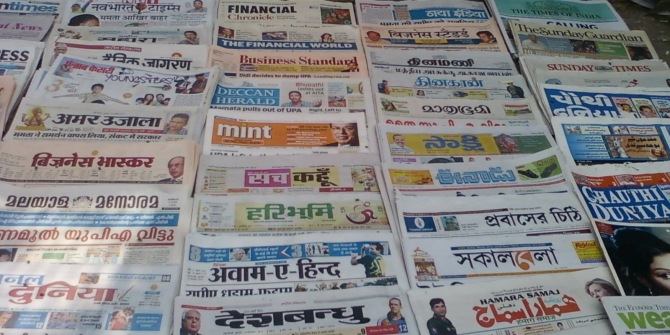Tomila Lankina and Lullit Getachew find that Christian missions operating throughout India influenced post-colonial democracy by promoting education, particularly female literacy.
It is a well-known truism that India is a nation of stark sub-national variations in development and governance. While Kerala boasts universal literacy and a vibrant democratic process, other states have suffered from abysmal education levels and poor democratic governance. Earlier narratives to explain the puzzle of human capital and democratic variations have prioritised factors like caste, communalism, socio-economic development, uneven legacies of British colonialism, British colonial officials’ land tenure institutional choices, and indeed the combination of factors “unique” to Kerala—Communist government, matriliny, and progressive native rulers.
LSE’s Dr Tomila Lankina and economist Dr Lullit Getachew (Power System Engineering, Madison) challenge these analyses by pointing to the hitherto neglected factor of the legacy of colonial-era Christian missions operating throughout India. They argue that missionaries influenced democracy by promoting education: education promoted social inclusivity and spurred social reform movements, which in turn influenced long-term development and democracy in Indian states.To make this case, Lankina and Getachew analyse longitudinal colonial census and other data from both the colonial and post-colonial periods for hundreds of districts across India. Based on cross-sectional time series and other statistical analyses as well as in-depth historical process-tracing studies, they find that Christian missionary legacies are a significant predictor of literacy – female literacy in particular – and of democratic variation throughout India.
These findings challenge narratives stressing the role of the caste structure, particularly in the southern states, which had been conducive to popular mobilisation for enfranchisement and socio-economic equity. They also help nuance arguments highlighting state- and district-level variations in British India’s colonial policy.
The research also draws attention to the hitherto under-theorised human capital dimension of colonialism, which is distinct from the institutional focus of much of the existing scholarship. Lankina and Getachew’s statistical analysis shows that British rule may have had an indirecteffect on democracy through the human capital variable of male literacy. But it also effectively demonstrates that better literacy outcomes are more consistently attributable to missionary involvement than to British colonial institutions. This is because unlike colonial effects, which are limited to male literacy, Christianity has had consistently strong effects on both male and female literacy outcomes. Lankina and Getachew’s work uncovers no evidence of direct links between British rule and democratic outcomes in Indian states. In India’s sub-national contexts, the human capital effects of colonialism therefore trump its institutional effects.
Given these findings, this research has wider implications for comparative scholarship transcending the debates on the determinants of national and sub-national democracy in India. Colonialism has featured prominently in recent interdisciplinary debates on the origins of the “great divergence” in development among post-colonial nations, with British institutions in particular singled out for their ostensibly benign effects on democratic development in former colonies. Lankina and Getachew’s research should help refocus the emphasis of much of this scholarship from colonial powers to other actors operating in colonial domains.
For more information on this topic, see Tomila Lankina and Lullit Getachew, “Mission or Empire, Word or Sword? The Human Capital Legacy in Post-colonial Democratic Development”, American Journal of Political Science, Vol. 56, No. 2 (2012), pp. 465-83; and Tomila Lankina and Lullit Getachew, “Competitive Religious Entrepreneurs: Christian Missionaries and Female Education in Colonial and Post-colonial India”, British Journal of Political Science (July 2012).









1 Comments